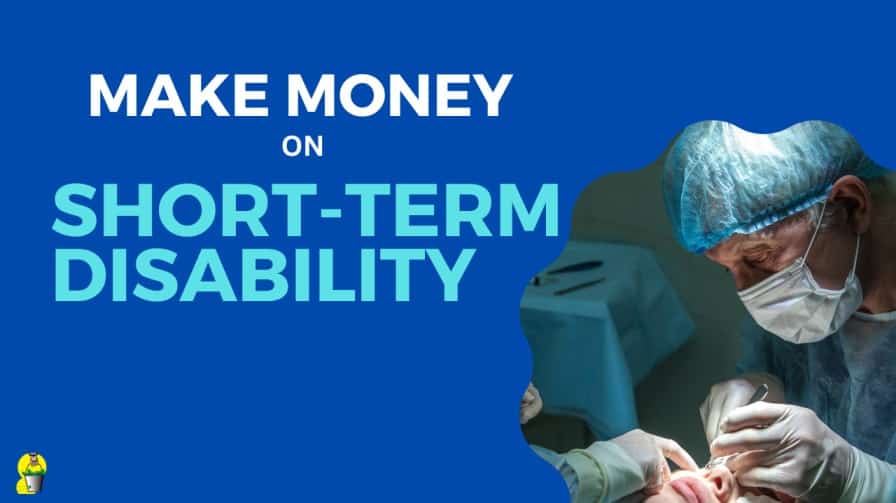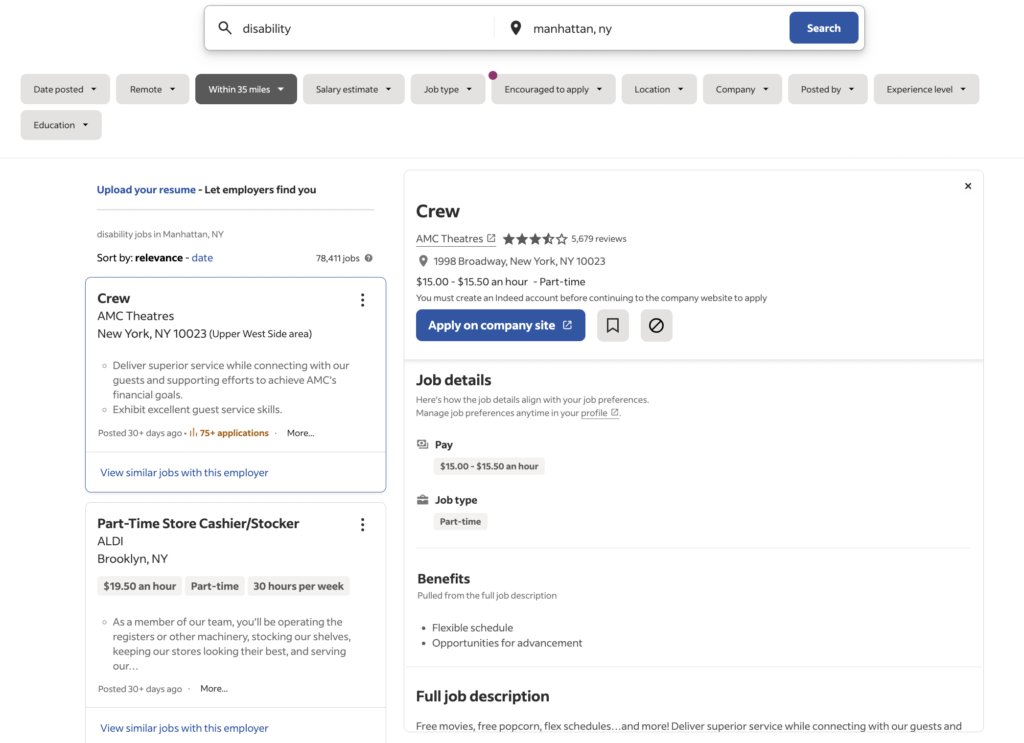While I may not have experienced short-term disability myself, I personally know friends who have, and financial worries can add to the stress.
But guess what?
I’ve got some insider tips on how to make money online while you’re on short-term disability.
How To Make Extra Money While on Short-Term Disability?
To make extra money while on short-term disability, consider jobs such as Freelance writers: $25-$50/hour, virtual assistants: $15-$30/hour, graphic designers: $20-$50/hour, social media managers: $15-$40/hour, Online tutors: $20 to $50. These roles offer flexible arrangements, allowing you to earn during your recovery.
I’m committed to providing you with useful information and resources to navigate this challenging period.

If you are in a hurry, you can just have a quick glimpse at the table. Alternatively, scroll down for all the in-depth ways to make money while on leave.
Summary:
| Topic | Key Information |
|---|---|
| 1. The Need for Short-Term Disability Benefits | Extended illness or injury unrelated to work can be financially challenging for employees and lead to productivity losses for employers Talent retention can become an issue when employees lack adequate support during their recovery. |
| 2. What Is Short-Term Disability Insurance? | Short-term disability provides income replacement on a weekly basis when employees are unable to work due to off-the-job accidents or illnesses. |
| 3. How Short-Term Disability Works | It can be employer-paid, employee-paid, or a combination. Employees become eligible after enrolling in a plan and can receive a portion of their weekly wages. Partial disability benefits incentivize employees to return to work. Rehabilitation services may include return-to-work plans with accommodations. |
| 4. Qualifications for Short-Term Disability | Common reasons include accidents, injuries illnesses, and maternity leave. The condition should not be related to work. |
| 5. Start Date and Duration | Payments can start on day one for certain accidents but typically begin on the eighth day after a claim is filed. Short-term disability is temporary, with durations ranging from 13 to 52 weeks. |
| 6. Short-Term vs. Long-Term Disability | Short-term disability lasts up to a year, while long-term disability can extend until Social Security’s normal retirement age or age 65. |
| 7. Payment Amount | The exact payment varies based on factors like age and weekly compensation. Employers’ cost for providing short- and long-term disability insurance is approximately 1% of total compensation cost. |
| 8. Tax Implications | Taxation of benefits depends on how premiums are paid. |
| 9. Benefits of Short-Term Disability Insurance | Employers can attract and retain talent, improve employee engagement, and enhance financial wellness through well-balanced disability plans. |
| 10. State Requirements | While short-term disability is optional in most states, some jurisdictions mandate it, including California, Hawaii, New Jersey, New York, Puerto Rico, and Rhode Island. |
What is Short-Term Disability?
Short-term disability is a situation where a person is temporarily unable to work due to a medical condition, illness, or injury. It’s like a pause in your ability to do your job because of health reasons.
I mean this can happen to anyone, and God forbid, it happens to you but if it does (I am guessing because you are reading the article), just know that I really am sorry.
I will try my best to help you earn a living or extra bucks on the side. (I know things can be challenging, but you can do it).
Jobs for Individuals with Short-Term Disability (Visual or Hearing Impairments)
Short-term disability doesn’t mean the end of the world for your career. You can still make money online can be a flexible option for individuals with disabilities to adapt to.
Visual Impairments:
- Accessibility Consultant: $45,000 – $75,000 per year
- Braille Transcriptionist: $30,000 – $50,000 per year
- Orientation and Mobility Specialist: $40,000 – $65,000 per year
- Assistive Technology Trainer: $40,000 – $70,000 per year
- Telephone Customer Service Representative (with adaptive technology): $30,000 – $50,000 per year
Hearing Impairments:
- Sign Language Interpreter: $40,000 – $70,000 per year
- Captionist: $35,000 – $60,000 per year
- Video Relay Service (VRS) Interpreter: $35,000 – $60,000 per year
- Graphic Designer (with adaptive technology): $40,000 – $80,000 per year
- Web Developer (with adaptive technology): $50,000 – $100,000+ per year
Jobs for Individuals with Cognitive Disabilities (e.g., Intellectual Disabilities):
- Job Coach: $25,000 – $45,000 per year
- Supported Living Assistant: $20,000 – $40,000 per year
- Workshop Instructor: $25,000 – $45,000 per year
- Custodial Worker (with support): $20,000 – $40,000 per year
- Food Service Worker (with support): $20,000 – $40,000 per year
Jobs for Individuals with Invisible Disabilities (e.g., Mental Health Conditions):
Mental Health Advocacy and Support:
- Mental Health Counselor: $40,000 – $70,000 per year
- Peer Support Specialist: $30,000 – $50,000 per year
- Mental Health Educator: $35,000 – $60,000 per year
- Crisis Hotline Operator: $30,000 – $50,000 per year
Remote and Flexible Jobs:
- Content Writer or Blogger: $35,000 – $65,000 per year
- Freelancer or Consultant: Earnings can vary widely based on expertise and projects.
- Online Tutor: Rates can vary, ranging from $25 to $75 per hour or more.
- Virtual Assistant: Salary varies based on tasks and responsibilities.
Artistic and Creative Fields:
- Artist: Income can vary widely based on the artist’s recognition and sales.
- Writer: Earnings vary depending on writing projects and publications.
- Musician: Income varies based on gigs, royalties, and recognition.
Information Technology (IT):
- Software Developer (with remote work option): $60,000 – $120,000+ per year
- IT Support Specialist (remote): $35,000 – $70,000 per year
Indeed.com has options just for disabled persons. You can also check that out and see if there’s anything that might fit your skills.

Exploring Ways to Make Extra Money Online for Disable People
Making money Online can be a viable source of income if you are on short-term disability and looking to make some extra cash on the side. In fact, there are several ways to do so, and even I do some of them.
Here’s a list of ways to earn money online while being disabled:
1. Freelancing: Picture this – you have skills, right? Whether it’s writing, designing, or coding, there are platforms like Upwork or Fiverr where you can offer your services and find clients.
2. Online Surveys and Stuff: It’s not a get-rich-quick thing, but hey, you can make some extra cash by sharing your opinions. Check out Swagbucks, Survey Junkie, or Pinecone Research.
3. Content Creation: If you’re into creating stuff like writing, videos, or podcasts, you can monetize your passion. You might start small, but with time and dedication, you can earn through ads, sponsorships, or selling your cool creations.
4. E-commerce Vibes: Ever thought about having your own online store? Platforms like Etsy or Shopify are great for selling handmade items or products without having to worry about a physical shop.
5. Virtual Assistant: You’ll be assisting businesses with tasks like scheduling and emails. You know, being the superhero behind the scenes.
6. Customer Service from Home: Put on your comfy pants and work from home as a customer service rep and help people with their questions and issues without leaving your cozy corner.
7. Tutoring Online: If you’re a subject whiz, become an online tutor. You can teach and help others with their studies via platforms like VIPKid or Chegg Tutors.
8. Affiliate Marketing: Imagine recommending products or services you love and getting a cut when someone buys through your recommendation. That’s affiliate marketing for you.
9. Stock Photos, Anyone?: If you’re into photography, sell your shots online. People are always in need of cool images for their websites, blogs, and more.
10. Coaching or Consulting: Sharing your expertise can also be a money-spinner. Whether it’s fitness tips, career advice, or business know-how, you can coach or consult online.
11. Write for Bucks: If you enjoy writing, why not pen down articles or even eBooks? You can self-publish your work on platforms like Amazon Kindle Direct Publishing.
12. Data Entry, Anyone?: Remote data entry jobs are out there. You’ll be working with data, spreadsheets, and numbers without leaving your comfort zone.
13. Transcription Gig: Ever thought about turning audio or video into text? That’s what transcribers do, and they make money doing it.
14. App and Website Testing: You can get paid for testing websites and apps. Your feedback helps companies improve their user experience.
15. Dropshipping Magic: Set up an online store, but here’s the twist – you don’t need to keep inventory. When someone buys, you order the product, and it’s shipped directly to them.
16. Online Fundraising: If you’ve got a cause or project, crowdfunding platforms like GoFundMe can help you raise funds for it.
17. Marketplaces: Create and sell digital products like templates or printables on platforms like Gumroad or Etsy.
Short-Term Disability Company Policies
| Aspect | Details |
|---|---|
| Elimination Period | Typically 7 to 8 days |
| Filing a Claim | This occurs in about 8% of cases |
| Benefit Duration | Up to 6 months (average duration: 57 days) |
| Transition to Long-Term Disability | The average is 60% of pay |
| Employer Premium Coverage | 72% of large employers offer coverage |
| Salary Replacement | The average is 60% of the pay |
How Much Does the Short-Term Disability Pay?
The amount short-term disability pays varies but typically covers a percentage of your regular pay.
The exact percentage and duration of payments depend on your specific policy or employer.
It’s essential to check your policy or discuss it with your employer’s HR department to understand the details of your short-term disability benefits.
Let’s take the example of a regular nurse.
If I work at a hospital and have short-term disability coverage through my employer. In case I get injured or become ill and need to take time off work, my short-term disability policy may cover, for instance, 60% of my regular salary for a specified period, let’s say up to six months.
Let’s break down the short-term disability payment for a Registered Nurse in the United States on average.
- Average Salary for a Registered Nurse: $103,096 per year
- Average Additional Cash Compensation: $4,657
Now, short-term disability typically covers a percentage of your regular salary, and it’s often around 60%.
Let’s calculate how much a Registered Nurse (in this case, I might receive in short-term disability payments):
- Short-Term Disability Payment (60% of Average Salary): 0.60 x $103,096 = $61,857.6 per year
Again, mind that the exact payment can vary depending on the specific policy terms and any additional cash compensation (if applicable) I might receive during my disability leave.
This is just an example case study.
How to Sell Used Items Online to Make Some Cash on the Side?
You’ve got some stuff lying around, and you’re thinking, “How can I make some extra cash from this?”
Selling used items online is like a digital garage sale (Gary Vee talks about this all the time) and I’m here to guide you through it, no fancy words, just plain old human talk.
Step 1: Gather Your Items
First things first, take a look around your place.
Find those items that you don’t need anymore. It’s like a treasure hunt but without the pirate hat.
Step 2: Research Online Marketplaces
Now, let’s talk about where to sell your goodies.
You’ve got options like eBay, Facebook Marketplace, and even Craigslist. Each one’s got its vibe, so choose the one that clicks with you.
Step 3: Take High-Quality Photos
Time to be a photographer!
Grab your phone or camera and click some good-quality photos of your items.
The better they look, the more moolah you can make.
Step 4: Write Descriptive Listings
Words matter a lot.
Describe your items accurately.
What’s the brand, size, and condition?
Why are you parting ways with it?
People appreciate honesty, just like in a good friendship.
Step 5: Set a Competitive Price
Now, the big question: how much should you ask for?
Well, I will suggest you go check out similar items online to get an idea of their prices.
Be competitive, but don’t sell yourself short.
Step 6: Create Your Listing
Time to put your item on the platform.
Upload those cool photos, write the description you thought about earlier, set the price, and choose how you want to handle shipping or pickup.
Step 7: Communicate Responsively
Potential buyers might have questions.
Be prompt and friendly in your replies.
Think of it as a chat with a buddy.
Step 8: Haggle Smart/ Negotiate and Finalize the Sale
When it is Negotiation time, be open to it, but also know your bottom line.
No need to give your stuff away for free.
Types of Short-Term Disability
I will claim to be no medical expert but I know a few things about Short-Term Disability.
Visual or Hearing Impairments:
Visual Impairments:
- Recovery from Cataract Surgery – A person may experience temporary vision impairment following cataract surgery, requiring time off work for healing.
- Severe Eye Infection – It can lead to temporary vision loss, necessitating a leave of absence for medical treatment and recovery.
Hearing Impairments:
- Sudden Hearing Loss – Requiring time off work for medical evaluation and treatment.
- Ear Injury – Perforated eardrum, can result in temporary hearing impairment and the need for medical leave.
Cognitive Disabilities (e.g., Intellectual Disabilities):
- Recovery from Brain Injury – Ouch but sustaining a head injury can cause cognitive impairments temporarily, requiring rehabilitation and time off work.
- Severe Concussion – Cognitive challenges and memory issues, necessitating a leave of absence for recovery.
Invisible Disabilities (e.g., Mental Health Conditions):
- Acute Anxiety Disorder – Experience sudden and severe anxiety symptoms, making it difficult to function at work, and requiring time off for therapy and treatment.
- Major Depressive Episode – Extreme fatigue and an inability to perform daily tasks, leading to a temporary leave of absence for mental health care.
US Bureau Of Labor & Statistics on Short-Term Disability
According to the USA Bureau of Labor, In 2022, 21.3 percent of persons with a disability were employed, up from 19.1 percent in 2021. For persons without a disability, 65.4 percent were employed in 2022, up from 63.7 percent in the prior year.
Are there any government programs that can provide financial assistance while on short-term disability?
Fortunately, there are some government programs that can provide financial assistance during this difficult time.
Refer here for the full list.
1. Security Disability Insurance (SSDI) program.
If you have paid into Social Security through taxes, you may be eligible for this program.
But, it’s important to note that there is a waiting period before you can receive benefits, and the amount you receive will depend on your work history and how much you have paid into Social Security.
2. Supplemental Security Income (SSI) program
This program is designed to help people with disabilities who have limited income and resources.
Again, eligibility requirements can be strict, and the amount you receive may not be enough to cover all of your expenses.
Frequently Asked Questions
How Can I Earn Extra Money While Receiving Short-Term Disability Benefits?
You can look for part-time work that accommodates your disability, such as working from home or doing freelance work. Please, it’s important to keep in mind that any income you earn may affect your disability benefits. You should consult with your disability insurance provider to determine the specific rules and regulations that apply to your situation.
Can I Start a Small Business While on Short-Term Disability?
Yes, you can start a small business while on short-term disability is possible, but it can be challenging if it requires you to work long hours or perform physically demanding tasks. You will also need to consider the financial implications of starting a business, as any income you earn may affect your disability benefits.
Is It Possible to Work from Home While on Short-Term Disability?
Yes, working from home is a great option for people on short-term disability, as it allows you to work in a comfortable environment and avoid the physical demands of commuting to an office.






